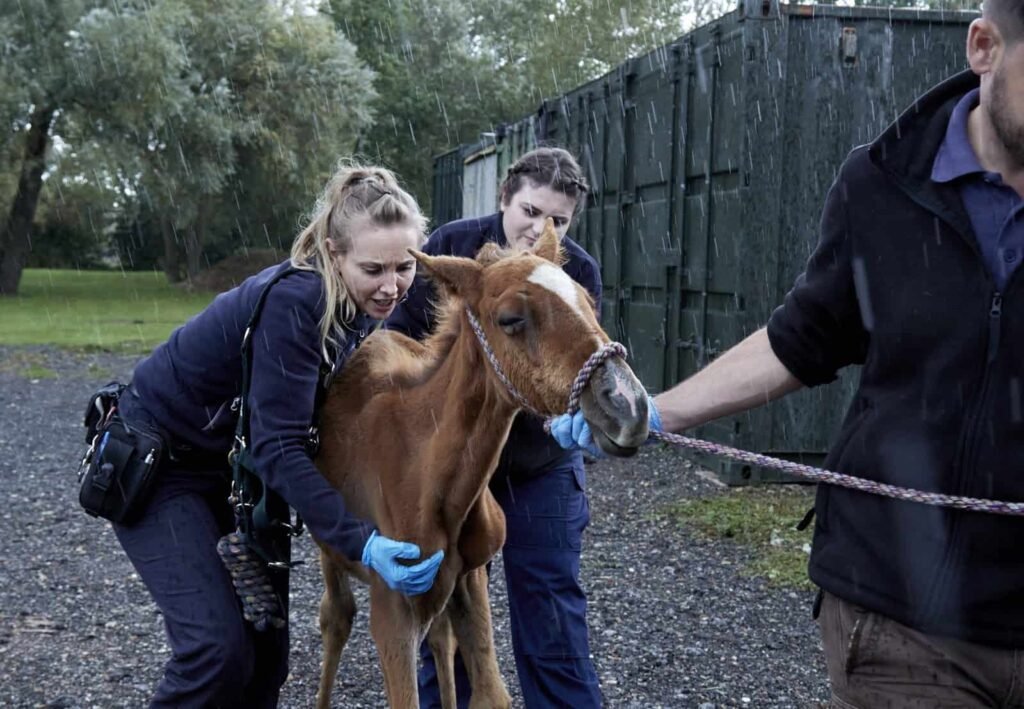Horse welfare and rescue embody crucial aspects of animal rights, focusing on the protection, rehabilitation, and ethical treatment of horses. This comprehensive guide deepens our understanding of these vital efforts, offering insights from rescue operations, expert advice, and actionable steps for those committed to improving the lives of horses.
Importance of Horse Welfare
Horse welfare covers the holistic well-being of horses, including their physical health, psychological state, and living conditions. Ensuring welfare requires continuous care, attention, and education to provide horses with a life free from suffering and distress.
Key Elements of Horse Welfare:
- Nutritional Care: Horses need access to a balanced diet that includes forage, grains, and constant fresh water to maintain health and energy levels. For more detailed guidance, check out this complete guide to horse nutrition, feeding, and care, which offers essential tips on feeding practices.
- Shelter and Comfort: Adequate shelter must protect horses from the harsh elements, whether extreme cold, heat, or rain. The environment should also allow for sufficient space for movement and exercise, mimicking natural conditions.
- Healthcare: Regular veterinary check-ups, dental care, and hoof maintenance are critical to prevent health issues and detect potential illnesses early. For example, understanding conditions like red eye in horses is crucial for preventing discomfort and promoting eye health. You can learn more about causes, treatments, and solutions for red eye in horses.
- Behavioral Fulfillment: Horses are social animals that need interaction, grazing time, and activities that allow them to engage in their natural behaviors. Isolation or lack of enrichment can lead to behavioral issues or depression.
Proper horse care not only enhances their quality of life but also serves as a proactive measure to prevent neglect and abuse, which often stems from mismanagement or misinformation.
The Role of Horse Rescue Organizations

Horse rescue organizations play an indispensable role in the welfare of horses. These groups work tirelessly to rescue, rehabilitate, and rehome horses, often pulling them out of severe conditions of neglect or abuse.
Responsibilities of Horse Rescue Organizations:
- Rescue and Rehabilitation: Teams of rescuers respond to cases of horses in distress, removing them from hazardous environments and providing immediate medical care. This often includes rehabilitating malnourished or injured horses, a long and complex process that requires skill and patience.
- Rehome Efforts: Once the horses are restored to health, the organization strives to place them in loving, permanent homes through adoption programs.
- Education and Outreach: One of the key functions of these organizations is public education, helping people understand the responsibilities of horse ownership and best practices for horse welfare.
Navigating Challenges in Horse Rescue
Horse rescue operations are essential but often face several significant challenges. Each of these obstacles requires innovative solutions and community support to overcome.
Key Challenges in Horse Rescue:
- Financial Strain: Caring for horses, especially those requiring special medical attention, involves substantial costs. From veterinary bills to nutrition and shelter upkeep, rescue operations must rely on donations and fundraisers, which can be inconsistent.
- Legal Obstacles: Rescuing horses from abusive environments involves navigating complex legal systems, where proof of neglect must be established before horses can be legally removed.
- Capacity Limits: Rescue organizations often work with limited space and resources, making it challenging to accommodate the increasing number of horses in need.
- Post-Rescue Placement: Finding suitable homes for rescued horses is another major hurdle. Older horses or those with specific needs may struggle to find homes, often remaining in the care of rescue organizations for extended periods.
Transformative Rescue Stories
Personal stories from horse rescues illustrate the life-changing impact these efforts have on individual animals and showcase the dedication of those working in the field.
- Midnight’s Journey: Midnight was discovered emaciated and in poor condition, left to fend for himself after being abandoned on a remote farm. After receiving months of medical treatment, nutritional support, and rehabilitation, Midnight was finally adopted by a loving family. His story is a testament to the resilience of horses and the importance of horse rescue efforts.
- Grace’s Rehabilitation: Grace, an elderly mare, was found in a state of severe neglect, suffering from untreated arthritis and painful hoof conditions. After receiving the veterinary care and therapy she needed, Grace was moved to a sanctuary for elderly horses, where she now lives out her days in peace. Her story highlights the challenges of rehabilitating older horses and the rewards of giving them a second chance.
Expert Insights and Practical Advice
Gaining insight from professionals in the equestrian and veterinary fields can significantly enhance our approach to horse welfare. These experts provide critical advice on health management, training, and rescue logistics.
- Veterinarian Insight: According to Dr. Emily Ward, preventative care is key to maintaining a horse’s health. Regular dental checks, vaccinations, and nutritional assessments help prevent issues before they escalate.
- Rescue Operator Insight: John Michaels, founder of a successful rescue center, speaks about the emotional and logistical challenges involved in running a rescue. He underscores the importance of legislative advocacy and community support to help scale operations and save more horses.
How to Support Horse Welfare and Rescue
There are numerous ways individuals can contribute to horse welfare and rescue, ranging from hands-on involvement to advocacy.
Ways to Support:
- Volunteering: Donating your time at a local horse rescue can provide essential help, from cleaning stables to assisting in feeding and grooming.
- Financial and Material Support: Even small donations go a long way in providing for the daily care of rescued horses. Supplies such as blankets, medical kits, and grooming tools are also much appreciated.
- Fostering: If you have space, consider fostering a rescue horse. This temporary care arrangement can relieve crowded rescue centers and provide horses with a loving, transitional home until they find a permanent one.
- Advocacy for Stronger Laws: Advocacy plays a vital role in creating long-term change. Support organizations working to pass laws that protect horses from abuse, neglect, and illegal sales.
Frequently Asked Questions
Q1: How do I identify a reputable horse rescue?
- A1: Look for licensing, check financial transparency, and research the organization’s status with animal welfare accreditation bodies. Word of mouth and testimonials from past adopters can also provide insights into the rescue’s operations.
Q2: What should I consider before adopting a rescue horse?
- A2: Be sure to evaluate your long-term commitment in terms of space, finances, and care. Adopted horses may require additional veterinary care or behavioral rehabilitation.
Q3: Can rescue horses be trained for riding or competitions?
- A3: Many rescue horses, once rehabilitated, can participate in riding or even competitions. Assessment by a professional trainer and a structured training regimen are advised.
Q4: How can children contribute to horse welfare?
- A4: Educating children about responsible horse care through books, documentaries, and visits to rescues can instill a sense of compassion and responsibility early in life.
Conclusion
Protecting and rehabilitating horses is an ongoing, compassionate effort requiring community involvement, advocacy, and dedication. Every horse rescued not only receives a second chance at life but also highlights the profound impact that individuals and organizations can make. By supporting horse rescue operations, educating ourselves, and advocating for better welfare laws, we can ensure that these magnificent animals live the lives they deserve—filled with care, respect, and dignity.

